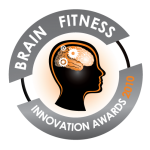Update: Meet 10 Innovation Awards Finalists, and New Resource
We are pleased to announce that, out of the 40 great entries submitted, the 10 Finalists to the 2010 Brain Fitness Innovation Awards moving to the next round are (ordered by approximate age of end user population, from younger to older):
- Arrowsmith School,
- USA
 Hockey,
Hockey, - Nationwide Mutual Insurance,
- University Behavioral HealthCare/ University of Medicine & Dentistry of New Jersey,
- Allstate,
- AAA Foundation for Traffic Safety,
- Saint Luke’s Brain and Stroke Institute,
- Oakland Unified School District,
- Mental Health Association of Rockland County,
- SCAN Health Plan.
Winners will be announced during the State of Brain Fitness Innovation Webinar on May 24th, noon-1pm Pacific Time. Registration is now open ($25), and includes executive summary of SharpBrains’ 2010 market report and access to private LinkedIn network. Learn More Here.
News & Analysis
BBC “Brain Training” Experiment: the Good, the Bad, the Ugly: You probably saw the hundreds of media articles titled “brain training doesn’t work”, based on a BBC experiment. Once more, claims seem to go beyond the science backing them up … except that in this case it is the researchers, not the developers, who are responsible.
Alzheimer’s Disease Prevention or Cognitive Enhancement: an independent expert panel just released yesterday a thoughtful report on the state of the science for prevention of Alzheimer’s Disease. Before people get scared away by “there is nothing that works”, everyone should understand that this is true but different from “there is nothing we can do to reduce the probability from developing Alzheimer’s symptoms” or “there is nothing we can do today to enhance our cognitive functions today and tomorrow”.
New Resource
We have created a new section in SharpBrains.com to contribute to the ongoing conversation on cognitive health and brain fitness, based on last year’s book by Alvaro Fernandez and Dr. Elkhonon Goldberg. Main sections are:
Debunking 10 Brain Myths: The goal of this resource is to help you make informed decisions about brain health and cognitive fitness, based on latest scientific findings. First of all, let’s debunk some common myths.
1. Brain Fitness Fundamentals: The brain is composed of a number of specialized regions serving distinct functions. Our life and productivity depend on a variety of brain functions, not just one, and there is nothing inherently fixed in the trajectory of how brain functions evolve as we age.
2. The 4 Pillars of Brain Maintenance: Thanks to lifelong neuroplasticity and neurogenesis, our lifestyles and actions play a meaningful role in how our brains physically change. There is no “magic pill”, but the need for a multi-pronged approach.
3. Mental Exercise vs. Mental Activity: Mental exercise (or “brain training”) goes beyond mental activity in general. Mental exercise is the structured use of exercises or techniques aimed at improving specific brain functions, and can be delivered in a number of ways: meditation, cognitive therapy, cognitive training, biofeedback.
4. Making Informed Brain Training Decisions: The state of the research does not allow for strong “prescriptions” of specific products for everyone and everything: here we offer information to navigate claims and make better informed decisions.
5. Brain Fitness through the Lifespan: The same way there are many reasons to exercise our bodies, there are many reasons to exercise our brains. Here we review a few current and future applications of mental exercise through the lifespan, including education, corporate wellness, retirement communities, clinical conditions, and more.
6. Ready for the Future?: We believe that more and more lifelong learners will look for innovative ways to integrate brain fitness to their everyday activities, and more professionals will identify opportunities to offer new services and programs. Here we discuss main trends.
7. Opening the Debate: Processing new information is a stimulating intellectual exercise, and discussing insights and open questions with a group of people can be even more stimulating. Here we offer questions for book clubs and invite you to continue the conversation via Facebook, Twitter, and LinkedIn.
Have a great month of May. And please say Hello to the new neurons in your brain that weren’t up there when you woke up this morning.


